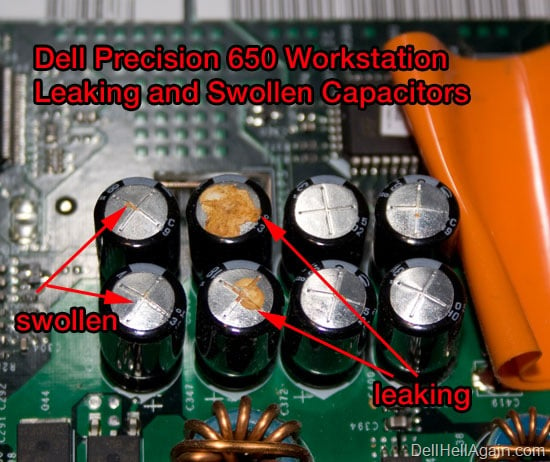Legal Documents Confirm Dell Knowingly Sold Defective Hardware
If you've been around a few years, you may remember a period in the early 2000s when a large number of motherboards from a variety of vendors began to fail in spectacular fashion. Symptoms ranged from a few swollen capacitors to actual small explosions as the diminutive parts took off for parts unknown. This event, known colloquially as the Great Capacitor Meltdown, affected almost every motherboard manufacturer, though it struck some companies harder than others.
What we didn't know back then was that the problem had hit Dell much harder than some of the other major OEMs and motherboard manufacturers. New documents (Scribd) that have recently been unsealed in a three year case against the Round Rock company paint a decidedly nasty picture of a manufacturer that was quite aware of the hardware failures, but instructed its own staff to remain silent.
One of the documents is a response to Dell's request for summary judgment and can be read here. The filing states that Dell knew about the high rate of capacitor failure at least a year earlier than the company admits, partly because "Dell admitted knowing as of January 2003 that a single customer had 450 motherboard failures."
It gets even more fun. According to the brief:
Dell is similarly accused of conducting sham investigations into the problem that avoided admitting a widespread failure, deliberate disregard for industry best practices as they relate to quality control, and a steadfast willingness to ignore a failure rate that may have been as high as 97 percent. The New York Times describes this saga as 'highlighting' Dell's descent from industry darling to scapegoat, but in our opinion, these are issues anyone could have seen coming 15 years ago. In a world where "You get what you pay for," is axiomatic, it was easy to predict that Dell's relentless focus on driving costs downward would inevitably have an impact on hardware quality and customer satisfaction.
If Dell was inordinately affected by the component failures, as the suit implies, it was because the company had become overdependent on second-tier suppliers that weren't themselves focused on quality control. That could be brushed aside as nothing more than bad luck, but the company's behavior once it identified the problem was nothing short of abominable. Seen properly, Dell's reputation hasn't declined—it's simply beginning to reflect reality as opposed to wishful thinking. The now-public brief makes it clear that Dell didn't just gloss over the truth, it engaged in sustained obfuscation and spent years pretending to 'analyze' a situation in order to explain why systems were failing when, in reality, it already knew exactly why.
What we didn't know back then was that the problem had hit Dell much harder than some of the other major OEMs and motherboard manufacturers. New documents (Scribd) that have recently been unsealed in a three year case against the Round Rock company paint a decidedly nasty picture of a manufacturer that was quite aware of the hardware failures, but instructed its own staff to remain silent.
One of the documents is a response to Dell's request for summary judgment and can be read here. The filing states that Dell knew about the high rate of capacitor failure at least a year earlier than the company admits, partly because "Dell admitted knowing as of January 2003 that a single customer had 450 motherboard failures."
It gets even more fun. According to the brief:
Dell documents indicate strenuous efforts to attribute OptiPlex failures to customer use and site conditions even when Dell knew that defective capacitors were to blame...Dell attributes failure of Nichicon capacitors to "very aggressive user profile" because University of Texas mathematics laboratory used machine to perform "advanced mathematical calculations..." Dell internal communication acknowledges that motherboard replacements would have solved the OptiPlex problem but "[t]his has not been messaged to the customer.The company also blamed failures on the fact that OptiPlex systems were being used as servers, even though it knew beforehand that the machines were purchased for this purpose and had no objection.
Dell is similarly accused of conducting sham investigations into the problem that avoided admitting a widespread failure, deliberate disregard for industry best practices as they relate to quality control, and a steadfast willingness to ignore a failure rate that may have been as high as 97 percent. The New York Times describes this saga as 'highlighting' Dell's descent from industry darling to scapegoat, but in our opinion, these are issues anyone could have seen coming 15 years ago. In a world where "You get what you pay for," is axiomatic, it was easy to predict that Dell's relentless focus on driving costs downward would inevitably have an impact on hardware quality and customer satisfaction.
If Dell was inordinately affected by the component failures, as the suit implies, it was because the company had become overdependent on second-tier suppliers that weren't themselves focused on quality control. That could be brushed aside as nothing more than bad luck, but the company's behavior once it identified the problem was nothing short of abominable. Seen properly, Dell's reputation hasn't declined—it's simply beginning to reflect reality as opposed to wishful thinking. The now-public brief makes it clear that Dell didn't just gloss over the truth, it engaged in sustained obfuscation and spent years pretending to 'analyze' a situation in order to explain why systems were failing when, in reality, it already knew exactly why.


